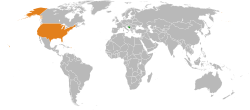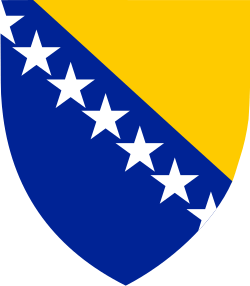Bosnia and Herzegovina–United States relations
Bosnia and Herzegovina–United States relations are the bilateral relations between Bosnia and Herzegovina and the United States of America. The 1992–95 war in Bosnia and Herzegovina was ended with the help of participation by the United States in brokering the 1995 Dayton Agreement. The United States maintains command of the NATO headquarters in Sarajevo. The United States has donated hundreds of millions of dollars to help with infrastructure, humanitarian aid, economic development, and military reconstruction in Bosnia and Herzegovina. The U.S. Agency for International Development (USAID) and Support for Eastern European Democracies (SEED) has played a large role in post-war Bosnia and Herzegovina, including programs in economic development and reform, democratic reform (media, elections), infrastructure development, and training programs for Bosnian professionals, among others. Additionally, there are many non-governmental organizations (NGOs) that have likewise played significant roles in the reconstruction.[1][2]
 | |
Bosnia and Herzegovina |
United States |
|---|---|
| Diplomatic mission | |
| Bosnian and Herzegovinian Embassy, Washington, D.C. | United States Embassy, Sarajevo |
| Envoy | |
| Ambassador Haris Hrle | Ambassador Eric George Nelson |
According to the 2012 U.S. Global Leadership Report, 33% of Bosnia and Herzegovina's people approve of U.S. leadership, with 49% disapproving and 18% uncertain.[3]
Diplomatic missions
The U.S. Embassy in Bosnia and Herzegovina is in Sarajevo. Bosnia and Herzegovina has an embassy in Washington, D.C.[4]
The US Ambassador is Eric George Nelson.
See also
References
- United States Department of State
- Wayne Burt, The Reluctant Superpower: United States' Policy in Bosnia, 1991-95 (1997)
- U.S. Global Leadership Project Report - 2012 Gallup
- "Archived copy". Archived from the original on 2009-09-04. Retrieved 2010-03-01.CS1 maint: archived copy as title (link)
![]()
Further reading
- Burt, Wayne. The Reluctant Superpower: United States' Policy in Bosnia, 1991-95 (1997) excerpt also online review
- Hume, Susan E. "Two decades of Bosnian place-making in St. Louis, Missouri." Journal of Cultural Geography 32.1 (2015): 1-22.
- Meštrovic, Stjepan G. The Conceit of Innocence: Losing the Conscience of the West in the War against Bosnia (1997), online review
- Miller, Olivia. "Bosnian Americans." Gale Encyclopedia of Multicultural America, edited by Thomas Riggs, (3rd ed., vol. 1, Gale, 2014), pp. 331-341. online
- Puskar, Samira. Bosnian Americans of Chicagoland (Arcadia Publishing, 2007).
External links
| Wikimedia Commons has media related to Relations of Bosnia and Herzegovina and the United States. |
